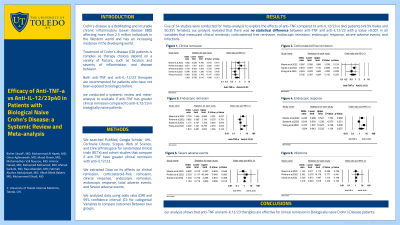Monday Poster Session
Category: IBD
P2584 - Efficacy of Anti-TNF-a vs Anti-IL-12/23p40 in Patients With Biological Naive Crohn's Disease: A Systemic Review and Meta-Analysis
Monday, October 28, 2024
10:30 AM - 4:00 PM ET
Location: Exhibit Hall E

Has Audio
.jpg)
Bisher Sawaf, MD
University of Toledo Health Sciences Campus
Toledo, OH
Presenting Author(s)
Mohammad Al Hayek, MD1, Omar Aghneewah, MD2, Bisher Sawaf, MD3, Moad Ekreer, MD4, Mohamedhen Vall Nounou, 5, Ammar Fahaid, MD6, Mohamed Mohamed, MD7, Ahmed Sardahi, MD8, Raja Abeedah, MD6, Fatimah Alzahra Abduljawad, MD9, Hibah Bileid Bakeer, MD10, Muhammed Elhadi, 6
1Damascus University, Damascus, Dimashq, Syria; 2Tobruk University College of Human Medicine, Tobruk, Al Butnan, Libya; 3University of Toledo Health Sciences Campus, Toledo, OH; 4Mansoura University, Almansoura, Ad Daqahliyah, Egypt; 5Nouakchott, Nouakchott, Nouakchott, Mauritania; 6University of Tripoli, Tripoli, Tripoli, Libya; 7Ain Shams University, Cairo, Al Qahirah, Egypt; 8Cairo University, Cairo, Al Qahirah, Egypt; 9University of Benghazi, Benghazi, Benghazi, Libya; 10Gharyan Medicine University, Gharyan, Tripoli, Libya
Introduction: Crohn’s disease is a debilitating and incurable chronic inflammatory bowel disease (IBD) affecting more than 2.5 million individuals in the Western world and has an increasing incidence in the developing world. Treatment of Crohn's disease (CD) patients is complex as therapy choices depend on a variety of factors, such as location and severity of inflammation, and disease behavior. Anti-TNF and anti-IL-12/23 therapies are recommended for patients who have not been exposed to biologics before. we conducted a systemic review and meta-analysis to evaluate if anti-TNF has greater clinical remission compared to anti-IL12/23 in biologically naive patients.
Methods: We searched PubMed, Google Scholar, VHL, Cochrane Library, Scopus, Web of Science, and ClinicalTrials.gove for randomized clinical trials (RCTs) and cohort studies that compare if anti-TNF have greater clinical remission with anti-IL12/23. We extracted Data on its effects on clinical remission, corticosteroid-free remission, clinical response, endoscopic remission, endoscopic response, total adverse events, and Severe adverse events. We analyzed data using odds ratio (OR) and 95% confidence interval (CI) for categorical Variables to compare outcomes Between two groups.
Results: Five of 54 studies were conducted for meta-analysis to explore the effects of anti-TNF compared to anti-IL12/23 in 945 patients (49.5% males and 50.35% females), our analysis revealed that there was no statistical difference between anti-TNF and anti-IL12/23 with p-value>0.001 in all variables that measured: clinical remission, corticosteroid free remission, endoscopic remission, endoscopic response, severe adverse events, and Infections.
Discussion: our analysis shows that anti-TNF and anti-IL12/23 therapies are effective for clinical remission in Biologically naive Crohn’s Disease patients.
Disclosures:
Mohammad Al Hayek, MD1, Omar Aghneewah, MD2, Bisher Sawaf, MD3, Moad Ekreer, MD4, Mohamedhen Vall Nounou, 5, Ammar Fahaid, MD6, Mohamed Mohamed, MD7, Ahmed Sardahi, MD8, Raja Abeedah, MD6, Fatimah Alzahra Abduljawad, MD9, Hibah Bileid Bakeer, MD10, Muhammed Elhadi, 6. P2584 - Efficacy of Anti-TNF-a vs Anti-IL-12/23p40 in Patients With Biological Naive Crohn's Disease: A Systemic Review and Meta-Analysis, ACG 2024 Annual Scientific Meeting Abstracts. Philadelphia, PA: American College of Gastroenterology.
1Damascus University, Damascus, Dimashq, Syria; 2Tobruk University College of Human Medicine, Tobruk, Al Butnan, Libya; 3University of Toledo Health Sciences Campus, Toledo, OH; 4Mansoura University, Almansoura, Ad Daqahliyah, Egypt; 5Nouakchott, Nouakchott, Nouakchott, Mauritania; 6University of Tripoli, Tripoli, Tripoli, Libya; 7Ain Shams University, Cairo, Al Qahirah, Egypt; 8Cairo University, Cairo, Al Qahirah, Egypt; 9University of Benghazi, Benghazi, Benghazi, Libya; 10Gharyan Medicine University, Gharyan, Tripoli, Libya
Introduction: Crohn’s disease is a debilitating and incurable chronic inflammatory bowel disease (IBD) affecting more than 2.5 million individuals in the Western world and has an increasing incidence in the developing world. Treatment of Crohn's disease (CD) patients is complex as therapy choices depend on a variety of factors, such as location and severity of inflammation, and disease behavior. Anti-TNF and anti-IL-12/23 therapies are recommended for patients who have not been exposed to biologics before. we conducted a systemic review and meta-analysis to evaluate if anti-TNF has greater clinical remission compared to anti-IL12/23 in biologically naive patients.
Methods: We searched PubMed, Google Scholar, VHL, Cochrane Library, Scopus, Web of Science, and ClinicalTrials.gove for randomized clinical trials (RCTs) and cohort studies that compare if anti-TNF have greater clinical remission with anti-IL12/23. We extracted Data on its effects on clinical remission, corticosteroid-free remission, clinical response, endoscopic remission, endoscopic response, total adverse events, and Severe adverse events. We analyzed data using odds ratio (OR) and 95% confidence interval (CI) for categorical Variables to compare outcomes Between two groups.
Results: Five of 54 studies were conducted for meta-analysis to explore the effects of anti-TNF compared to anti-IL12/23 in 945 patients (49.5% males and 50.35% females), our analysis revealed that there was no statistical difference between anti-TNF and anti-IL12/23 with p-value>0.001 in all variables that measured: clinical remission, corticosteroid free remission, endoscopic remission, endoscopic response, severe adverse events, and Infections.
Discussion: our analysis shows that anti-TNF and anti-IL12/23 therapies are effective for clinical remission in Biologically naive Crohn’s Disease patients.
Disclosures:
Mohammad Al Hayek indicated no relevant financial relationships.
Omar Aghneewah indicated no relevant financial relationships.
Bisher Sawaf indicated no relevant financial relationships.
Moad Ekreer indicated no relevant financial relationships.
Mohamedhen Vall Nounou indicated no relevant financial relationships.
Ammar Fahaid indicated no relevant financial relationships.
Mohamed Mohamed indicated no relevant financial relationships.
Ahmed Sardahi indicated no relevant financial relationships.
Raja Abeedah indicated no relevant financial relationships.
Fatimah Alzahra Abduljawad indicated no relevant financial relationships.
Hibah Bileid Bakeer indicated no relevant financial relationships.
Muhammed Elhadi indicated no relevant financial relationships.
Mohammad Al Hayek, MD1, Omar Aghneewah, MD2, Bisher Sawaf, MD3, Moad Ekreer, MD4, Mohamedhen Vall Nounou, 5, Ammar Fahaid, MD6, Mohamed Mohamed, MD7, Ahmed Sardahi, MD8, Raja Abeedah, MD6, Fatimah Alzahra Abduljawad, MD9, Hibah Bileid Bakeer, MD10, Muhammed Elhadi, 6. P2584 - Efficacy of Anti-TNF-a vs Anti-IL-12/23p40 in Patients With Biological Naive Crohn's Disease: A Systemic Review and Meta-Analysis, ACG 2024 Annual Scientific Meeting Abstracts. Philadelphia, PA: American College of Gastroenterology.
